Luong Van Can Fund and MAI:TRI Vietnam organized the training program “Self-Ology: Knowing (About) Yourself.”
The “Self-Ology: Knowing (About) Yourself” training program was held by 𝗠𝗔𝗜:𝘁𝗿𝗶 and Luong Van Can Fund for five consecutive weeks starting on December 14th. 𝗠𝗔𝗜:𝘁𝗿𝗶 is a therapeutic space that utilizes art to nurture the body, mind, and soul through community activities. The program aimed to help Luong Van Can Fund students and the community gain a deeper understanding of themselves at the physical, mental, and emotional levels. It also provided practical skills in mindfulness, relaxation, and visual creativity for self-care, emotional regulation, and stress reduction.
The training program was facilitated by Ms. Nguyen Huong Linh, a former Fulbright scholar of 2017, who completed the Master of Art Therapy (MPS Art Therapy) program at the School of Visual Arts (New York, USA) in 2020. Under Ms. Linh’s guidance, Luong Van Can Fund students had the opportunity to explore their inner selves and understand their personal needs through art-based practices, including painting, color, and music.
Online classes were organized regularly every Wednesday night, starting at 19:00 and ending at 21:00. Prior to each class, participants engaged in a “10-minute self-reflection” exercise under the guidance of Ms. Linh, aimed at relaxing the body and focusing the mind in preparation for the upcoming content.
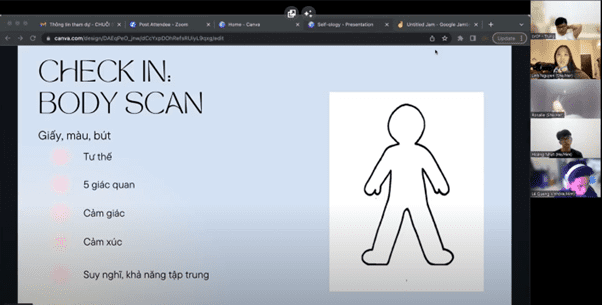
At the beginning of each session, participants collectively performed a body check to review the previous lesson’s content and mentally prepare for the upcoming activities.
Each week, students were introduced to different theoretical knowledge and practical exercises, providing them with additional tools to regulate their emotions and enhance personal energy levels.
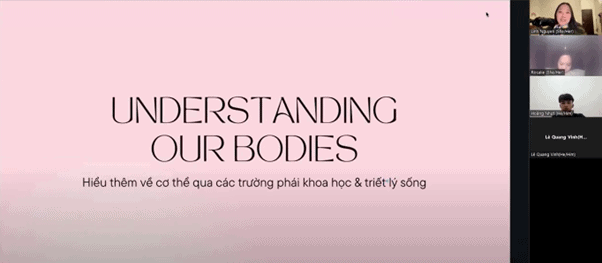
During the first week, Ms. Linh presented various perspectives on understanding the body from Eastern and Western viewpoints. She guided participants to explore their bodies through these different perspectives.
Fundamentally, an individual’s health can be divided into three parts: biological health, psychological health, and social health. Categorizing health into these groups enables individuals to find appropriate solutions for their mental well-being when they do not feel well, rather than relying solely on general treatment methods as in the past.
In the second session, participants learned about establishing a harmonious relationship with the nervous system through the theory of nerves and engaged in practical activities to relax the mind, tailored to individual needs. The knowledge shared in the second session was both scientifically grounded and highly applicable, aiding participants in better retaining information related to the human brain and understanding how the brain responds to difficulties, challenges, and stressors.
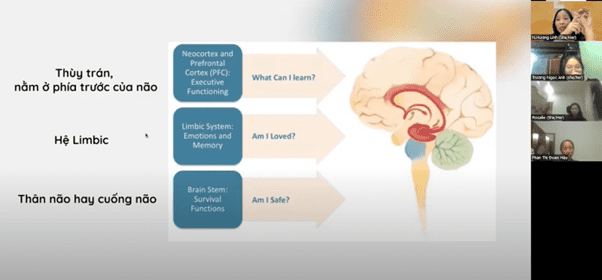
The theory explained the brain’s functioning.
In the third session, participants had the opportunity to explore theoretical lessons and practical exercises related to decoding human emotions.
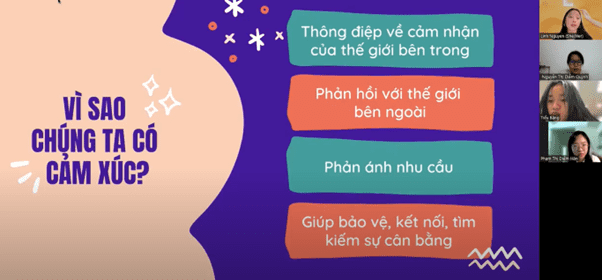
According to Ms. Linh, emotions are an individual’s response to the external world, expressing their feelings and thoughts towards the subjects around them. Emotions also reflect personal needs and serve as a shield to protect individuals when it comes to balancing their own emotions and communicating with others. In this session, Ms. Linh also helped the participants identify common misconceptions about emotions. She also provided a better understanding of emotional reactions to difficult issues and how to effectively regulate one’s own emotions.
In the fourth session, participants were introduced to more advanced knowledge and techniques for delving deeper into the psyche, listening to the inner voices, rather than denying their existence. According to Ms. Linh, each individual can be divided into three inner groups: managers, firefighters, and exiles. These groups represent different responses and explain the motivations behind each person’s actions
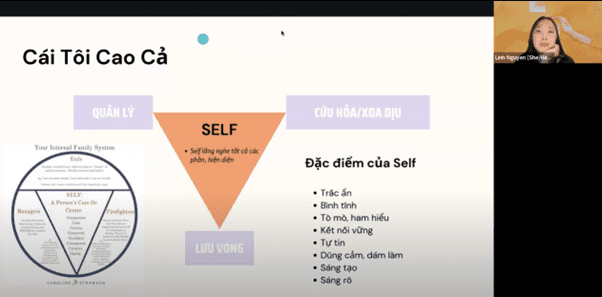
An individual’s responses to external activities reflect their current psychology and emotions. Being able to interpret personal needs will help students find effective ways to take care of their mental well-being.
During the fifth lesson, participants had the opportunity to integrate the knowledge from previous weeks and engage in practical exercises to deepen their understanding of the content. The theoretical components were intertwined with activities involving music, colors, and sharing among the students, creating a safe space for exchange. This environment allowed students to unload mental burdens and overcome psychological obstacles. With a creative and approachable approach, the students learned additional mindfulness practices and methods for taking care of their mental health through daily activities.
Luong Van Can Fund expresses gratitude for the support of MAI:tri on our journey to assist Vietnamese students. We hope that the “Self-Ology: Knowing (about) yourself” workshop will reach out to more individuals and communities in need. Our aim is for students to achieve balance and find peace within their souls through this program.
Source: LVCF Media Team



